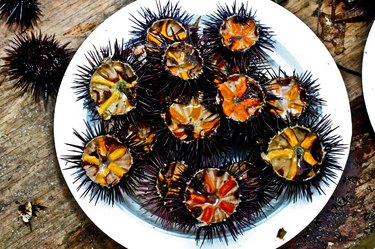
Sea urchins, known as the porcupines of the sea, belong to the same family as starfish and sea cucumbers. Here's what you need to know about the benefits of eating sea urchin.
Video of the Day
Video of the Day
Uni: A Japanese Delicacy
Sea urchins are considered a delicacy in many cuisines, Japanese especially. According to the University of Maine, Japan is the largest consumer of sea urchins. Uni, or sea urchin gonads, is served in Japanese sushi restaurants and as a holiday treat. Uni is also interchangeably referred to as roe; however, roe technically means eggs. Uni is found inside the spiky shell of the sea urchin once you cut it open.
Uni is served fresh and is usually uncooked. It is also sometimes added to foods like soup, pasta and other seafood dishes. Per the University of Maine, good-quality uni is orange, gold or yellow in color and has a sweetish, ocean-like flavor and buttery smooth texture. Poor-quality uni that looks grainy, loose, watery, dull and discolored, and has a bitter taste should be avoided.
The University of Maine notes that increased demand for sea urchins had made them vulnerable to overfishing; however, several countries have now started aquaculture programs to grow sea urchins sustainably to keep up with the demand.
Read more: Which Is Better: Wild-Caught or Farmed Fish?
Sea Urchin Nutrition
Sea urchins have a nutrition profile that is similar to other types of seafood in that they are good sources of protein and healthy fats. The University of Maine recognizes sea urchins as a low-calorie source of protein and omega-3 fatty acids.
Omega-3 fatty acids are healthy fats that are good for your heart. According to the American Heart Association, omega-3 reduces your risk of heart disease and stroke. This benefit of sea urchins can give you a good excuse to eat them regularly if you're fond of them because the American Heart Association recommends eating two servings of fatty fish that contain omega-3 per week.
Read more: 7 Fish Recipes That Are Great for Your Heart
A study published in the April 2016 issue of the journal Food Chemistry that investigated sea urchins' nutritional benefits found that the gonads are rich in essential amino acids. According to the U.S. National Library of Medicine, of the 20 types of amino acids, nine are considered essential because your body cannot make them by itself and so you must obtain them from your diet.
The April 2016 study in Food Chemistry also evaluated the carbohydrate content in sea urchins and found that carbs make up less than 2 percent of the sea urchin's composition, making them a good option for low-carb diets.
Given that sea urchins are low in calories as well, they can make a good addition to weight loss diets, since they provide healthy nutrients with minimal calories. The majority of sea urchins' calories are from protein and fatty acids.
A study published in the journal Marine Drugs in June 2017 highlights another benefit of sea urchins: They're a good source of antioxidants known as carotenoids that help protect against neurodegenerative diseases.
- Woods Hole Oceanographic Institute: “Sea Urchins”
- University of Maine: “Green Sea Urchin Aquaculture”
- University of Maine: “Maine Seafood Guide – Sea Urchin”
- American Heart Association: “Fish and Omega-3 Fatty Acids”
- U.S. National Library of Medicine: “Nutrient Composition and Antioxidant Activity of Gonads of Sea Urchin Stomopneustes variolaris”
- U.S. National Library of Medicine: “Amino Acids”
- Marine Drugs: “The Sea Urchin Arbacia lixula: A Novel Natural Source of Astaxanthin”